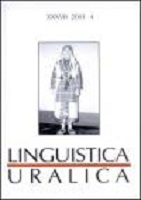O суффиксах русского происхождения в марийском языке
On the Suffixes of Russian Origin in Mari
Author(s): Serafima SibatrovaSubject(s): Finno-Ugrian studies
Published by: Teaduste Akadeemia Kirjastus
Keywords: Mari language; Russian language; borrowed suffixes; suffix derivation
Summary/Abstract: Мari and Russian belong to different language families and typological classes. In spite of that it is possible that in an environment of active Mari-Russian bilingualism even bound morphemes can be borrowed. These morphemes are borrowed into the language alongside frequent or less frequent lexemes. After recognizing and distinguishing them as separate morphemes they may be used in conjunction with stems other than the ones they were borrowed with according to the principle of analogy. In the Mari language there are a number of inflectional and derivational suffixes of Russian origin. These are markers of subjective evaluation -уш, -ук, -у, -ка (mostly used in pronouns of Russian origin) and derivational morphemes -ишкӓ/-ишка, -ук, -ушка, -ец, -ун, -ар observed in certain dialectal words. The suffixes -ишкӓ, -ук, -ушка, -ец form new lexemes from Mari stems in the Hill Mari dialect, mostly with semantics referring to persons. In the North-Western dialect, one such word with the suffix -ун has been attested, while the Meadow-Eastern Mari literary language features a lexeme with the suffix -aр.
Journal: Linguistica Uralica
- Issue Year: LII/2016
- Issue No: 2
- Page Range: 93-102
- Page Count: 10
- Language: Russian

